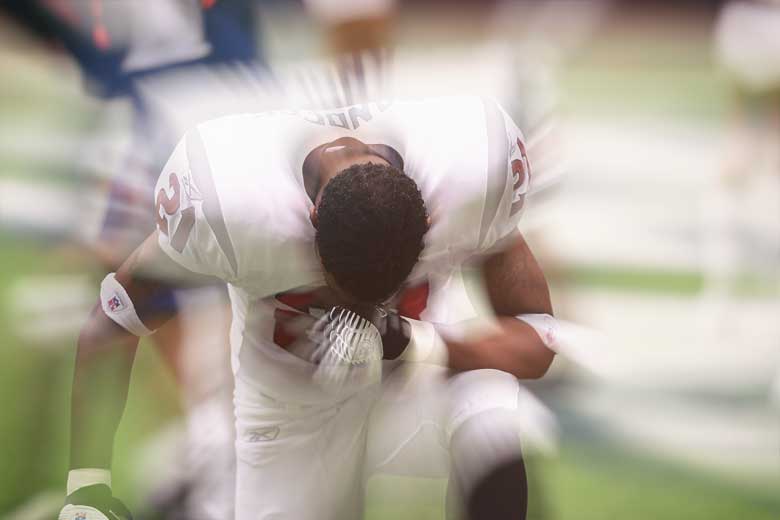
We will soon be entering our third NFL season where the attention, for many, will not be solely on the game, but also on the conversation about racial inequality and police brutality against persons of color.
This conversation (started by Colin Kaepernick in August 2016) is still ongoing, but has taken an unfortunate turn. For this upcoming season, the NFL owners have chosen to create an internal policy requiring players to stand for the National Anthem when on the field, with the intent to prevent protests and suppress the voices of those who were calling attention to the issues caused by systemic racism.
Today, as I write, it is with the specific frustration that the acknowledgement of my white, male, Christian privilege is not shared by many of my fellow white, male, Christians. Truth be told, I wish I didn’t have to speak or write about this topic, as it generally leads to a discussion and debate among them that I am already tired of.
And yet, I must be vigilant in reminding myself of the privilege I possess. Opting to turn a blind eye or ignore a problem simply because it is exhausting is a luxury that isn’t afforded to everyone. These conversations matter as they affect the very lives of people of color; and they don’t have the benefit of looking away when they get tired.
What’s become the most frustrating thing about this topic is the way that it is regularly framed: as a protest against our actual anthem and flag, and, by extension, the government, specifically military service-members and veterans. Rather than waste time explaining why I believe this logic is false and flawed, I feel it is prudent to point out the idolatry in it, particularly when the argument gets perpetuated by my fellow white, male, Christians (emphasis on the Christians).
There is a story in the Bible in chapter three of the Book of Daniel. This story concerns three young men, Shadrach, Mechach, and Abednego. If you’ve ever been to Sunday School, it’s a story you are most likely familiar with. The “TL;DR” version, for those unfamiliar, is that the King of Babylon, Nebuchadnezzar, created a large golden idol, set it on a plain in Babylon, and commanded everyone to fall down and worship the idol whenever they heard a specific piece of music (starting to sound familiar?). Our three protagonists were turned in because they didn’t worship the idol as commanded and thus faced the punishment, which in this story was death. However — spoiler alert — they didn’t die, but instead their example was used as a testament to their faith and their beliefs.
As a Christian, I am frustrated because this is an example of the kind of story I grew up with in church. A story that somehow gets lost in translation when compared to modern society. Shadrach, Mechach, and Abednego were Hebrews living in exile, in a foreign land and given foreign names. They were commanded to worship an idol representing a king and an empire that essentially sought to rob them of their Jewish heritage, identity, and beliefs. So, instead of conforming to the imperialistic status quo, they literally and metaphorically stood in protest against the injustices they had experienced as Hebrews at the hands of the Babylonian autocracy. For Christians, this is a story of courage, bravery, and standing in faith for what one believes in, but, when it comes to these practices during the national anthem prior to a football game, most Christians no longer seem to value these principles.
Today we live in a nation not too different from Babylon. We are guilty of slavery and mass genocide in the names of colonialism and imperialism. We have a long history of racist and discriminatory practices, not just against people of color but also of gender, sexual, and religious minorities. Many like to claim that these practices are far from view in our history, but they’re not. And instead of getting mad at the injustices occurring around us, hegemonic Christians (most of whom are also white males) would rather get upset at the few who (in our present-day situation) chose to kneel when our anthem gets played.
What I don’t understand is how Christians today can read a story like this in Daniel, but be so blind to our flaws as a nation and the harm that’s been caused to our brothers and sisters in Christ. What’s more, rather than caring about the message and the reasons for the act of protest, many would rather condemn the very act as disrespectful or unpatriotic.
Please don’t misconstrue my message. I see nothing wrong with standing during the national anthem or the Pledge of Allegiance. I don’t think it’s wrong as Christians to show support and honor for our country, though some Christian traditions like the Mennonites and other Anabaptists choose not to recite the Pledge or anthem specifically because they believe their first allegiance should be to God (and I’ve never heard hegemonic Christians complain about them).
But, when Christians hold these patriotic practices above our call to share the Gospel of reconciliation — this is when these practices turn from patriotic gestures into acts of idolatry. Racism, especially at the institutional and systemic levels, is a Gospel issue. When we demean, suppress, and try to prevent those with a platform to address racial injustices from speaking and protesting, we have effectively perverted the integrity of this Gospel. Christians are missing opportunities to heal, restore, and reconcile with those most affected by racism because we would rather demonstrate allegiance to an empire than deal with the sins of that empire.
I will reiterate, there is nothing wrong with showing love for your country, but don’t let the gospel of patriotism pervert or dilute the Gospel of reconciliation. So, to those of you, particularly my fellow white, male, Christians, who continue to claim you are down with this message, this Gospel of reconciliation, but continue to insist that maybe this isn’t the time, place, or best way to protest these issues, I have nothing more to say or offer, personally, but to leave you with the words of Martin Luther King Jr.:
“…There are some instances when a law is just on its face and unjust in its application. … [W}hen the ordinance is used to preserve segregation and to deny citizens the First Amendment privilege of peaceful assembly and peaceful protest, then it becomes unjust. … Of course, there is nothing new about this kind of civil disobedience. It was seen sublimely in the refusal of Shadrach, Meshach, and Abednego to obey the laws of Nebuchadnezzar because a higher moral law was involved. … I must make two honest confessions to you, my Christian and Jewish brothers. First, I must confess that over the last few years I have been gravely disappointed with the white moderate. I have almost reached the regrettable conclusion that the Negro’s great stumbling block in the stride toward freedom is not the White Citizens Counsillor or the Ku Klux Klanner but the white moderate who is more devoted to order than to justice; who prefers a negative peace which is the absence of tension to a positive peace which is the presence of justice; who constantly says, ‘I agree with you in the goal you seek, but I can’t agree with your methods of direct action’; who paternalistically feels that he can set the timetable for another man’s freedom; who lives by the myth of time; and who constantly advises the Negro to wait until a ‘more convenient season.’…” –Letter from Birmingham Jail, Martin Luther King Jr.
Photo via Pixabay.
 About Alex Camire
About Alex Camire
Alex Camire is an ex-fundamentalist Christian who is passionate about his faith, minus the dogma. He has worked in behavioral health for several years and is working on obtaining his Masters in Social Work. He and his wife, Charline, live in Windsor, CT. And when he’s not working, in school, or binge-watching Netflix with his wife, he enjoys reading and writing about religion and the intersections of faith, science, law, and social justice. Follow him on WordPress or Facebook.